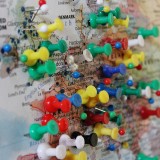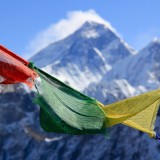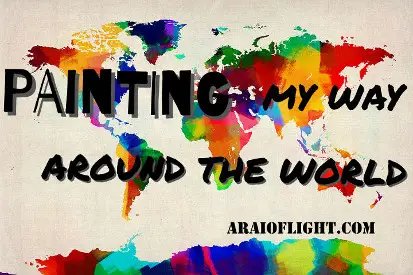150+ Ways To Say THANK YOU in Different Languages (w/ Pronunciation!)
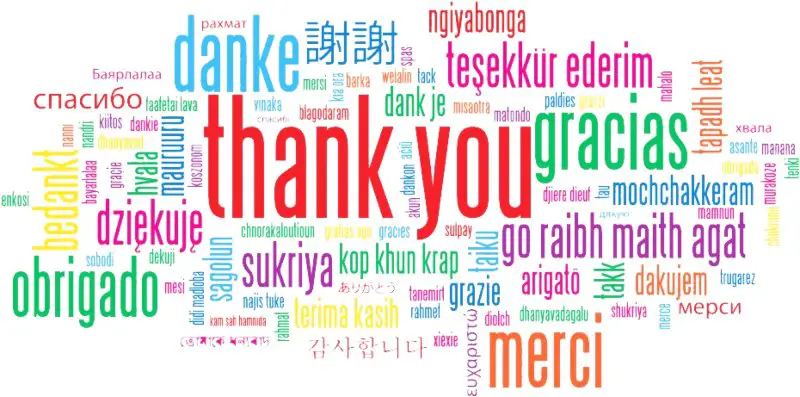
Thank you: The simplest of expressions that has the power and influence to create goodwill, generate smiles, form a bond between strangers, and build lasting impressions. A simple ‘thank you‘ is likely to be one of the first travel words you’ll use when travelling abroad and it’s always a good idea to know a few words in the language of the country you’re visiting. Here’s your ultimate guide on how to say thank you in different languages around the world. With pronunciation!
Showing gratitude and having a respectful manner has the potential to incline a local to treat you better and also to create opportunities out of seemingly nowhere. Maybe even the opportunity to make a new friend.
If you wanted to thank every person in the world, you would need to learn those words from over 5,000 languages. Fortunately, just by reading this guide on thanks in different languages I have put together for you, you will be able to say thank you in all languages to over 85% of the world’s population 🙂
That’s over 100 ways to say thank you. So whether you find yourself in Africa, Europe, Asia, or South America, I’ve got you covered.
Be sure to bookmark and save this thank you different languages guide for future use and ease of reference.
Did you know:
the 11th of January is International Thank You Day
Want to learn how to say HELLO and GOODBYE too?
Read this guide to say hello in different languages and goodbye in different languages.

THANK YOU IN DIFFERENT LANGUAGES
Here’s your definitive resource: 150 ways on how to say thank you in different languages around the world.
With pronunciation:
In brackets you will find how to pronounce the word as it can often be difficult to know how to vocalise the word by just looking or reading the direct translation.
Want to learn how to say GOOD MORNING and GOOD NIGHT too?
Read this guide to express good morning in a different language
and good night in every language.
Are you ready to take a beautiful journey and learn how to thank everyone around the world?
If you don’t spot YOUR language, let me know and I will be happy to add it to this list.
Thank you in multiple languages —> Let’s go guys… Be sure to scroll to the bottom for a bonus ↓↓
Do you know:
Where does the term thank you come from?
The word thank originated from the Latin word tongēre, of which the root word tong means “think.”
Many would express their gratitude by saying, “I think of you kindly.” This phrase then morphed into “I thank you.”
Over time, around the 14th century, it got shortened to “thank you,” as we know it today.
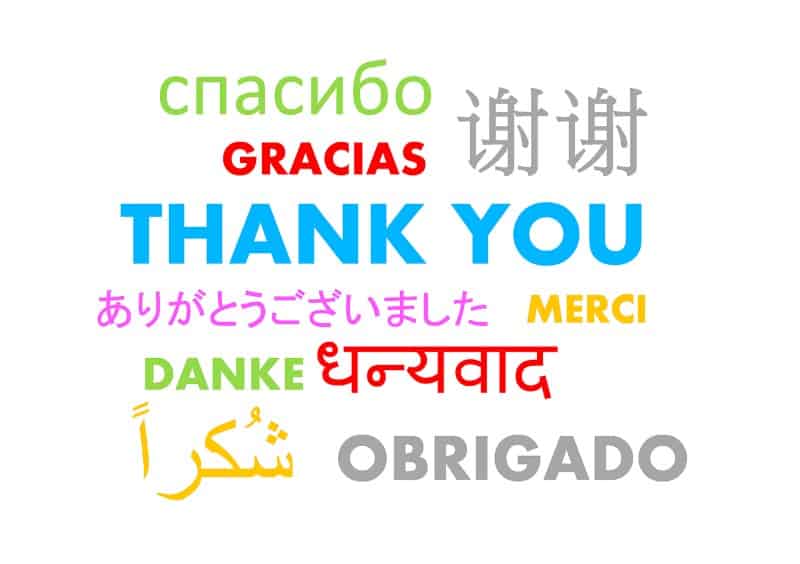
Want to learn how to say I LOVE YOU and LIGHT too?
Read this guide to express i love you in different languages
and light in all languages.
How do you say thank you in a different language? Thank you in every language in the world ↓
Let’s get into it…
Here’s how you say “thank you” in:
Afrikaans
- dankie (dahn-kie)
Afrikaans is a West Germanic language of southern Africa mostly derived from Dutch. It is mainly spoken in South Africa and Namibia by around 6 million people as their first language. It can also be heard in parts of Botswana and Zimbabwe.
Albanian
- faleminderit (fah-lehm-meen-DEH-reet)
Albanian is an Indo-European language, spoken mainly in Albania and Kosovo, though it is also spoken in other areas of the Balkans. With about 7.5 million speakers, it comprises an independent branch within the Indo-European languages and is not closely related to any other language in Europe.
Amharic
Thank you in Amharic is:
- ämäsäggənallähu አመሰግናለሁ
meaning “I praise you”
Amharic is a Semitic language and the official language of Ethiopia. Thank you not only means thanks you in different languages, but also I praise you. It can also be heard in Egypt and Eritrea, as well as in Israel, Sweden, Canada, and the United States.
Arabic
- shukran شكرا (shoe-kraan)
Arabic (العربية) is a Semitic language spoken by over 420 million people as their first language in areas including North Africa, the Arabian Peninsula, and other parts of the Middle East. Many more people can also understand it as a second language. Modern Standard Arabic is the liturgical language for 1.6 billion Muslims and is the official written form of the language with the Arabic alphabet, which is written from right to left.
Aragonese
- gracias
Aragonese is a language in the Romance language family that is native to Spain and spoken by just over 10, 000 people in the Pyrenees valley of Aragon.
Armenian
How to say thank you in Armenian:
- shnorhakalut’yun (shno-ra-ka-loo-TYOON) Շնորհակալություն
- merci (MEHR-see) — used more often.
Armenian is an Indo-European language spoken in the Republic of Armenia, as well as in large communities of Armenian diaspora by around 6.7 million people.
Assamese
- ধন্যবাদ dhoinnobad
— thanks in Assamese
Assamese is an Indo-Aryan language spoken in the northeast Indian state of Assam, where it is an official language. Native to India and Bangladesh, it is spoken by over 23 million people.
Asturian
- gracies
Asturian is a West Iberian Romance language spoken by around 400,000 people in Asturias, Spain.
Azerbaijani
- Təşəkkür edirəm (t-shek-kur ed’ram)
Azerbaijani or Azeri is the primary and official language of Azerbaijan by its 8.8 million native speakers. It is also widely spoken in Northern Iran and to a small extent in southern Dagestan, the Kvemo Kartli region of Georgia, eastern Turkey, in Shia cities of Iraq, like Karbala and Kirkuk. The language is a Turkic language and is highly intelligible with modern-day Turkish.
Balinese
Thank you in Balinesse:
- suksma (Suks-maa)
- terima kasih (Tur-EE-mah KAH-see)
Balinese is a Malayo-Polynesian language spoken by more than 3 million people on the Indonesian island of Bali as well as Northern Nusa Penida, Western Lombok and Eastern Java. Most Balinese speakers also know Indonesian.
Basque
- Eskerrik asko
Basque (euskara) is a language spoken in the Basque Country (Gipuzkoa, Araba, Bizkaia) and Navarra (in Spain) as well as in the French Basque Country (Labourd, Soule and Basse-Navarre). Linguistically, Basque is a language isolate and is unrelated to the other languages of Europe.
Bavarian / Austrian German
- Dankschee
Bavarian is a regional dialect of German spoken in the German state of Bavaria, western Austria, and Northeastern Italy by over 14 million people. It uses German grammar, but takes several root words from Latin.
Belarusian
- DZYAH-kooy Дзякуй
Belarusian is the official language of Belarus. This East Slavic language is also spoken in Russia, Ukraine, and Poland.
Bengali
- Dhonnobad (dhon-no-baad) ধন্যবাদ
Bengali বাংলা is the only official language of Bangladesh, one of the 22 official languages of India, and the sixth most spoken language in the world. It is spoken as a first language by the majority of the population in Bangladesh, as well as people in the Indian state of West Bengal.
Bodo
Say thank you in Bodo:
- Sabaikor
- Hambaiswi
Bodo बर’/बड़ is the Sino-Tibetan language spoken primarily by the Bodo people of Northeast India, Nepal, and Bengal. It is official language of the Bodoland Autonomous region and co-official language of the state of Assam in India.
Bosnian
- hvala (HVAH-lah)
Bosnian, a south Slavic language of the Indo-European family, is the official language of Bosnia and is essentially the same language as Croatian and Serbian. All three languages used to be known as Serbo-Croatian before the break-up of Yugoslavia.
Brazilian Portuguese
- obrigado (oh-bree-GAH-doo) said by a male
- obrigada (oh-bree-GAH-dah) said by a female
Brazilian Portuguese (Português do Brasil) is the variety of Portuguese dialect spoken in Brazil. It is spoken by virtually all of the 200 million inhabitants of Brazil and spoken widely across the Brazilian diaspora. European Portuguese differs from the Brazilian variety in pronunciation, as well as in some vocabulary.
Breton
- Trugarez
Breton is a Southwestern Brittonic language of the Celtic language spoken in Brittany in the northwest of France.
Bulgarian
Say thank you in Bulgarian:
- blagodaria благодаря
- merci (MEHR-see) — used as slang
Bulgarian is a South Slavic language spoken in Southeastern Europe, primarily in Bulgaria. It is the country’s only official language and Bulgarian is written with Cyrillic.
Burmese
Say thank you different languages in Burmese:
- ေက်းဇူးတန္ပါတယ္။ Kyeizu tin ba de
Burmese is a Sino-Tibetan language spoken in Myanmar where it is an official language and the language of the Bamar people, the country’s principal ethnic group.
Cambodian Khmer
- aw khun អរគុណ
Khmer is the language of the Khmer people and the official language of Cambodia. With over 16 million speakers, it is the second most widely spoken Austroasiatic language.
Catalan
- gràcies (GRAH-syuhs)
Catalan is a Western Romance language derived from Vulgar Latin and named after the medieval Principality of Catalonia, in northeastern of modern Spain. It is the only official language of Andorra, and a co-official language of the Spanish autonomous communities of Catalonia, the Balearic Islands of Spain and Valencia.
Cebuano
- salamat
Cebuano, also known as Bisaya or Binisaya, is an Austronesian language spoken in the southern Philippines region in Central Visayas, western parts of Eastern Visayas and the majority of Mindanao.
Chichewa
- zikomo
Chichewa, also known as Nyanja, is a Bantu language spoken in much of Southern, Southeast and East African countries. It is the national language of Malawi and is also spoken in Zambia, Mozambique, and Zimbabwe.

Chinese Cantonese
How to say thank you in Chinese:
- do jeh (daw-dyeh)
In China, it is more common to say thanks you with a small token of appreciation rather than saying thank you.
Cantonese is a variety of Chinese originating from the city of Guangzhou and its surrounding area in Southeastern China. Belonging to the Sino-Tibetan family of languages, it is the traditional prestige variety of the Yue Chinese dialect group, which has about 68 million native speakers.
Chinese Mandarin
Thank you in Mandarin:
- xie xie (shieh-shieh)
Mandarin Chinese is the official language of Mainland China and Taiwan, and is one of the official languages of Singapore. Mandarin is often placed first in lists of languages by number of native speakers with almost a billion speakers.
Corsican
- grazie (GRAHTS-yeh)
Corsican is a Romance language from the Italo-Dalmatian family that is spoken predominantly on the Mediterranean island of Corsica. Corsican is closely related to Tuscan and to the Florentine-based Italian.
Croatian
Say thank you in Croatian:
- hvala (HVAH-lah)
Croatian or Hrvatski is a South Slavic language spoken mainly in Croatia, Bosnia and Herzegovina, some parts of Serbia, and the neighbouring countries by about 5.5 million people.
Czech
- dêkuji (deh-ku-yih)
Czech is a Western Slavic language which is mutually intelligible with Slovak. It is mainly spoken in the Czech Republic with over 10,5 million speakers.
Danish
- tak (tahg)
Danish is a Scandinavian language and the only official language of the Kingdom of Denmark. It is spoken in Denmark and in some parts of Greenland and is closely related to Swedish and Norwegian.
Dhivehi
- Shukuriyaa
— is the word for thank you in Dhivehi
Dhivehi or Maldivian is an Indo-Aryan language spoken on the islands of Maldives where it is an official language.
Dutch
Thank you in Dutch:
- dank u (dahnk oo)
- dankjewel (dahnk-uh-wel)
Dutch is a West Germanic language spoken by about 27 million people world-wide mostly in the Netherlands and northern Belgium.
Dzongkha
- kadrin chhe
Dzonkha or Bhutanese is the sole official and national language of the Kingdom of Bhutan. This Sino-Tibetan language is spoken by over half a million people in Bhutan and is written with the Tibetan alphabet.
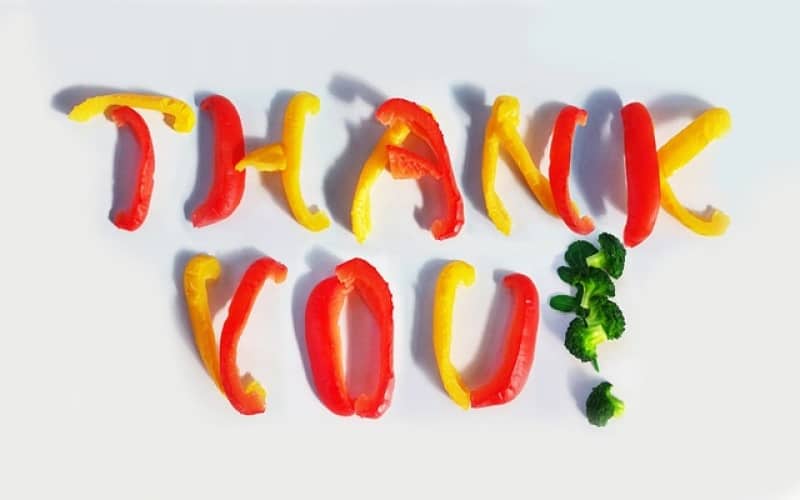
English
- thank you
10 other ways to say Thank You in every language
- I appreciate it
- I owe you one
- You’re so helpful
- I’m impressed
- Much obliged
- I’m forever indebted
- Accept my deepest gratitude
- I couldn’t have done it without you
- I’m incredibly grateful
- You are really kind
English is a West Germanic language that was first spoken in Anglo-Saxon England in the early Middle Ages. It is spoken in many countries around the world with over 375 million native speakers. English is the second most spoken language, and the most international language in the world.
Here are even more ways of saying thank you in different languages…
Estonian
- tänan (TA-nahn)
- aitäh — more common
Estonian is a Finno-Ugric language spoken as the official language in Estonia. It is closely related to Finnish.
Faroese
- takk
Faroese is a North Germanic language spoken as a first language by Faroe Islanders, residing on the Faroe Islands and in other areas, mainly Denmark.
Farsi / Persian
How to say thank you in Persian:
- xeyli mamnūnam خیلی ممنون
- merci مرسی
Persian is an ancient language belonging to the Iranian branch of the Indo-Iranian subdivision of the Indo-European languages. It is a pluricentric language predominantly spoken and used officially within Iran, Afghanistan, and Tajikistan.
Fijian
- vinaka (Vee-Nah-Kah)
Fijian is an Austronesian language of the Malayo-Polynesian family. It is an official language of Fiji spoken by some 350,000–450,000 ethnic Fijians as a native language.
Finnish
- kiitos (key-toss)
Finns usually greet each other in an informal way, so you can use these greetings in 99% of all situations.
Finnish is a Finno-Ugric language spoken only in Finland as the official language and by ethnic Finns elsewhere in Scandinavia.
French
How to say thank you in French:
- merci (MEHR-see)
French is a Romance language of the Indo-European family spoken by over 354 million people in France and around the world. It is the third most spoken language in Europe, the official language of 29 countries spoken in parts of Africa, North America, and South America.
Frisian
- dankewol
The Frisian languages are a closely related group of Germanic languages, spoken by about 500,000 Frisian people, who live on the southern fringes of the North Sea in the Netherlands and Germany.
Georgian
Thank you in Georgian:
- გმადლობთ (gmahd-lohbt) — formal
- გმადლობ (gmahd-lohb) — informal
Georgian is the official language of Georgia and the country’s most widely spoken language with over 4.1 million people.
German
Thank you in German:
- danke (dahn-kah)
German Deutsch is the official language of both Germany and Austria and one of the three official languages of Switzerland. German belongs to the West Germanic group of the Indo-European language family. One of the major languages of the world, German is a native language to almost 100 million people worldwide and the most widely spoken native language in the European Union.
Greek
How to say thank you in Greek:
- efharisto (ef-hah-rees-TOH)
Greek (ελληνικά) belongs to the Hellenic branch of the Indo-European language family, mainly spoken in Greece, the islands of Greece, and Cyprus an an official language. It has the longest documented history of any living Indo-European language, spanning more than 3,000 years of written records. There are about 13.1 million speakers of Greek worldwide and it is recognised as a minority language in Albania, Armenia, Hungary, Italy, Romania, Turkey, and Ukraine.
Greenlandic
- Qujanaq
— is the Greenlandic word for thanks
Greenlandic falls under the Eskimo–Aleut language family, spoken by around 57,000 Greenlandic Inuit people in Greenland.
Gujarati
- dhanyavaad (Dhan-ya-bad) ધન્યવાદ
- aabhar આભાર
Gujarati is an Indo-Aryan language native to the Indian state of Gujarat and spoken predominantly by the Gujarati people. Gujarati is part of the greater Indo-European language family.
Haitian Creole
Say thank you in different languages in Haiti:
- mesi/anpil (meh-SEE/on-PEEL)
Haitian Creole (kreyòl ayisyen)) is a French-based creole language spoken by 10–12 million people worldwide and the only language of most Haitians. Along with French it is one of the official languages of Haiti.
Hausa
- na gode
Hausa language, the most important indigenous bridge language in West and Central Africa, spoken as a first or second language by about 40–50 million people. It belongs to the Western branch of the Chadic language family within the Afro-Asiatic language phylum. It is spoken mainly in northern Nigeria and Niger, and also in Benin, Burkina Faso, Cameroon, the Central African Republic (CAR), Chad, Congo, Eritrea, Germany, Ghana, Sudan, and Togo.
Hawaiian
How to say thank you in Hawaiian:
- mahalo (ma-HA-lo)
The Hawaiian language is a Polynesian language that takes its name from Hawaiʻi, the largest island in the tropical North Pacific archipelago where it developed. Hawaiian, along with English, is an official language of the State of Hawaii. Check out these essential Hawaiian words to know.
Hebrew
- toda (toh-dah) .תודה
Hebrew is a Northwest Semitic language spoken by over nine million people worldwide. Historically, it is regarded as the language of the Israelites and their ancestors. It is written using its own script from right to left.
Hindi
How to say thank you in Hindi:
- sukria (shoo-kree-a)
- dhanyavād (Dhan-ya-bad)
Hindi (हिन्दी) is an Indo-European language spoken in India, Nepal, and throughout the Indian diaspora. Hindi is descended from Sanskrit, sometimes called “the mother of all languages.” While there are 22 official languages and over 1,000 dialects of India, Hindi and English take precedence in government affairs. It is a link-language for over half of India’s population.
Hmong
- ua tsaug (Oua jow)
Hmong is a Hmong-Mien language spoken by about 2.6 million people in China, Vietnam, Laos, Thailand, USA, and French Guiana.
Hopi
- askwali (ask waali)
Hopi is a Uto-Aztecan language spoken by the Hopi people in northeastern Arizona, USA.
Hungarian
How to say thank you in Hungarian:
- köszönöm (KØ-sø-nøm)
Hungarian is a Uralic language of the Ugric branch spoken in Hungary and parts of several neighbouring countries. It is the official language of Hungary and one of the 24 official languages of the European Union.
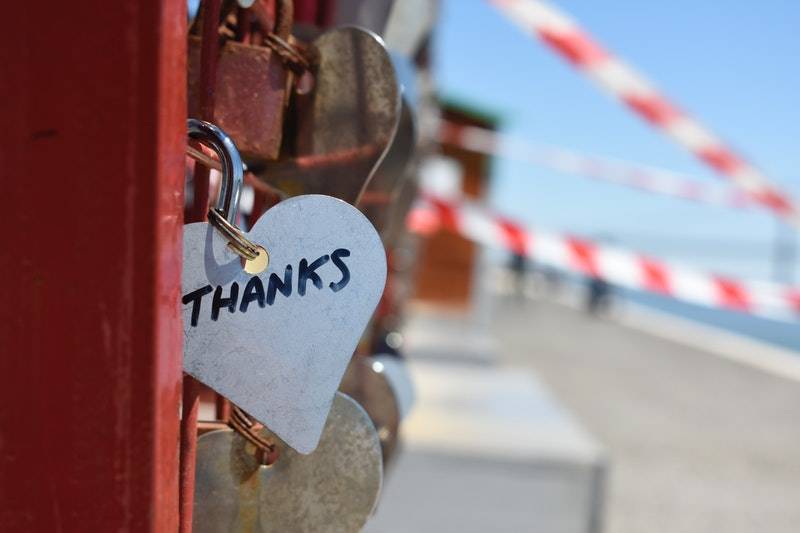
Icelandic
- takk (tahk)
Icelandic (íslenska) is a North Germanic language spoken in Iceland as its official language. It’s most closely related to Faroese and Western Norwegian and has around 314,000 speakers. The language is more conservative than most other Western European languages.
Indonesian Bahasa
- terima kasih (Tur-EE-mah KAH-see)
Indonesian (bahasa Indonesia) is the official language of Indonesia.With over 230 million speakers, it is one of the most widely spoken languages in the world. It is a group of varieties of Malay, an Austronesian language that has been used as the common language in the multilingual Indonesian archipelago for centuries. Indonesia uses the Latin alphabet system and Arabic numerals.
Inuktitut
- naqurmiik (Nak-urm-eek)
Inuktitut is an Eskimo-Aleut language spoken in Arctic territories and the topmost span of North America including Alaska and Northern Canada.
Irish
- go raibh maith agat (GUH ROH MAH ug-ut)
Irish (Gaeilge) is one of the three Goidelic languages, along with Scottish Gaelic and Manx. This Goidelic branch together with the Brythonic branch (Welsh, Cornish and Breton) form the Celtic language family.
Italian
Thank you in Italian:
- grazie (GRAHTS-yeh)
Italian (Italiano) is a Romance language of the Indo-European language family spoken by over 90 million people, the vast majority of which are in Italy, and the Italian islands of Sicily and Sardinia. It is the official language of Italy, San Marino, and the Vatican City.
Japanese
Say thank you in Japanese:
- arigato (ah-ree-GAH-toh)
Bowing, dating back to the 5th century, is a huge part of Japanese culture and is a sign of respect. In Japan, people readily bow to one another to show their thanks rather than actually saying the words.
Japanese (日本語 Nihongo) is an East Asian language of the Japonic language family. It is spoken by about 125 million people, mostly in Japan, where it is the official and national language.
Kannada
- dhanyavāda (Dhan-ya-bad-a) ಧನ್ಯವಾದ
Kannada, spoken by nearly 45 million native speakers, is a Dravidian language of the people of Karnataka in southwestern India, and by significant linguistic minorities in the states of Maharashtra, Andhra Pradesh, Tamil Nadu, Telangana, Kerala and abroad.
Kazakh
- raqmet (rakh-met) көп рақмет
Kazakh is a Turkic language of the Kipchak branch spoken in Central Asia and the official language of Kazakhstan. The language comprises 21 million native speakers including regions of Bayan-Ulgii in Mongolia and the Dzungarian region of Xinjiang, China.
Korean
Thank you in Korean:
- kamsa hamnida (GAM-sah-ham-NEE-da)
Korean, an East Asian language, is the official language of South Korea (Republic of Korea) and North Korea (Democratic People’s Republic of Korea) spoken by more than 75 million people.
Kurdish
- spas dikim
Kurdish is spoken by about 30 million Kurds in western Asia including parts of Kurdistan, Iraq, Turkey, Iran, and Syria. It is one of the Indo-Iranian languages, ranks as the third largest Iranian language, after Persian and Pashto.
Kyrgyz
- rakhmat (rah-maat)
Kyrgyz is a member of the Kipchak branch of the Turkic language family spoken by over 4 million speakers mainly in Kyrgyzstan, and also in China, Tajikistan, Afghanistan and Turkey.
Lao
- khawp jai ຂອບໃຈ
Lao is the main language of Laos. It is a Kra–Dai language serving as a common language among all citizens of Laos, who speak approximately 90 other languages, many of which are unrelated to Lao. Modern Lao is heavily influenced by the Thai language and comprises over 30 million native speakers.
Latin
- gratias tibi
Latin was the dominant language of the Roman Empire from 6th century BC to 600 AD. When the Roman Empire collapsed, Latin evolved into the various languages that we know today. Italian, French, Portuguese, Spanish, and Romanian all consider Latin as their parent tongue. Latin is a classical language belonging to the Italic branch of the Indo-European languages.
Latvian
Say thank you in Latvian:
- paldies (PUHL-dyehs)
Latvian (latviešu valoda) is an Indo-European Eastern Baltic language spoken in the Baltic region. It is the official language of Latvia and one of the official languages of the European Union.
Limburgish
- dankewaal
Limburgish is a member of the East Low Franconian group of the Germanic languages considered a variety of German or Dutch by many people. It is spoken by around 1.6 million people in the Netherlands and Belgium.
Lingala
- melesi
Lingala is a Bantu language spoken throughout the northwestern part of the Democratic Republic of the Congo and a large part of the Republic of the Congo by over 70 million people.
Lithuanian
Thank you in Lithuanian:
- ačiū (AH-choo)
Lithuanian (lietuvių kalba) is an Eastern Baltic language spoken in the Baltic region as the official language of Lithuania. It is also one of the official languages of the European Union spoken by just under 3 million native speakers. The language is one of the oldest in the world.
Luxembourgish
- merci (MEHR-see)
Luxembourgish is a West Germanic language that is spoken mainly in Luxembourg. About 390,000 people speak Luxembourgish worldwide.
Luganda
- webale
Luganda, a Bantu language, is an official language of Uganda along with English and Swahili. It is spoken primarily in Kampala, but may be understood in much of the country and in the African Great Lakes region.

Macedonian
- blagodaram (blah-GOH-dah-rahm) Благодарам
Macedonian, the official language of the Republic of North Macedonia, is a south Slavic language spoken as a first language by 2 million people.
Malagasy
- misaotra (meesh-OW-truh)
Malagasy is the national language of Madagascar belonging to the Austronesian Malayo-Polynesia family of languages spoken by 25 million people.
Malay
- terima kasih (Tur-EE-mah KAH-see)
Malay (Bahasa Melayu) is an Austronesian language spoken as the sole official language of Malaysia and Brunei. It is also heard in Indonesia, Singapore, and Thailand at a total of 250 – 300 million speakers.
Malayalam
How to say thank you in Malayalam is:
- nandi (nanni)
Malayalam (മലയാളം) belongs to the Dravidian language family, spoken mostly in the Southern Indian states of Kerala and Lakshadweep. Around 36 million people use this language, which is one of the 22 official languages of India.
Maltese
Say thank you in Maltese:
- grazzi (GRUTS-ee)
Maltese, a language of central Semitic origin written in the Latin script, is the national language of Malta. It is spoken by around 420,000 people on the Mediterranean islands of Malta, Gozo, and Comino. The Maltese language developed from Sicilian Arabic. Over the centuries, it has incorporated many words derived from English, Italian, and French.
Maori
- kia mihi
Māori is an Eastern Polynesian language spoken by the Māori people, the indigenous population of New Zealand. it has also gained recognition as one of New Zealand’s official languages.
Marathi
- dhanyawada (Dhan-ya-bad-a)
Marathi is an Indo-Aryan language spoken by around 83.1 million Marathi people of Maharashtra, India. It is the official language and co-official language in the Maharashtra and Goa states of Western India, respectively, and is one of the 22 scheduled languages of India.
Marshallese
- kom̧m̧ool — singular
- kwe emmal — plural
Marshallese, also known as Ebon, is a Micronesian language spoken in the Marshall Islands by about 44,000 people. It is an official language of the Marshall Islands, along with English, and is used as the language of instruction in most primary schools.
Mongolian
How to say thank you in Mongolian:
- bayarlalaa Баярлалаа
Mongolian is the official language of Mongolia and both the most widely-spoken and best-known member of the Mongolic language family. It is an Altaic language spoken by approximately 5 million people in Mongolia, China, Afghanistan, and Russia.
Nahuatl
- Tlazocamati
pronounced as (tlah-so-cah-mah-tee) - Tlazohcamati huel miac
— is used to say thank you very much
Nahuatl is a group of languages of the Uto-Aztecan language family. It was the language of the Aztecs and the Toltecs. Variations of Nahuatl are spoken by around 1.7 million Nahua people of Central Mexico, and the USA and Nahuatl remains the most widely-spoken group of Native American languages in North America.
Navajo
- Ahéhee
— is the general Navajo word for thank you, pronounced (ah-HYEH-heh)
Navajo is an American Indian language of the Athabascan family, spoken by around 170, 000 Navajo people in the Southwestern United States regions of Arizona, New Mexico, Utah, and Colorado.
Ndebele
- Ngiyabonga
Ndebele, an African language of the Nguni group of Bantu languages, is spoken by around 5 million Northern Ndebele people of Zimbabwe.
Nepali
- dhanyavād (Dhan-ya-bad) ढन्यबाद्
Nepali (नेपाली), is an Indo-Aryan language of the sub-branch of Eastern Pahari written in Devanagari script It is the sole official language of Nepal and one of the 22 scheduled languages of India. While most Nepalese people speak at least some Nepali, there are more than 100 different languages and dialects spoken in Nepal.
Northern Sotho
- ke a leboga
Northern Sotho is a Bantu language spoken primarily in South Africa, where it is one of the 11 official languages. It is spoken by about 4.2 million people in the South African provinces of Gauteng, Limpopo, and Mpumalanga.
Norwegian
Say thank you in Norwegian:
- takk (tahk)
Norwegian (norsk) is a Germanic language derived from Old Norse spoken primarily in Norway by over 5 million people where it is the official language.
Odia
- dhanyabaad (Dhan-ya-bad) ଧନ୍ୟବାଦ୍
Odia is an Indo-Aryan language spoken in the Indian state of Odisha where it is the official language.
Oromo
- galatoomi — singular
- galatoomaa — plural
Oromo is a Cushitic language spoken by about 30 million people in Ethiopia, Kenya, Somalia and Egypt. It is the third largest language in Africa.
Papiamento
Thanks you in Papiamento:
- danki
Papiamento is a Portuguese-based creole language spoken in the Dutch Caribbean by less than 500,00 native speakers. It is the most-widely spoken language on the Caribbean ABC islands, having official status in Aruba, Bonaire, and Curaçao.
Pashto
Thank you in Pashto:
- manana مننه
Pashto is an Eastern Iranian language in the Indo-European family spoken in Afghanistan, Pakistan and Iran. It is an official language of Afghanistan along with Dari.
Polish
Say thank you in Polish:
- dziekuje (dsyen-koo-yeh)
Polish (polski) is a West Slavic language spoken by about 45 million people. Said to be one of the hardest languages to learn, it is the official language of Poland. It is understood and can be used for communication in the western parts of Ukraine, Belarus and Lithuania.
Portuguese
- obrigado (oh-bree-GAH-doo) as a male
- obrigada (oh-bree-GAH-dah) as a female
Portuguese (português) is a Romance language spoken as the official language of Portugal and Brazil. It is also the official language of Cape Verde, Guinea-Bissau, São Tomé e Principe, Angola, Mozambique, and the co-official language of East Timor, and Macau. There are around 200 million native Portuguese speakers.
Punjabi
- tuhādā dhanavāda (Tu-haa-da Dhan-ya-bad)
Punjabi is an Indo-Aryan language with more than 130 million native speakers in the Indian subcontinent and around the world. It is the 10th most spoken language in the world.
Romanian
Say thank you in Romanian:
- mulţumesc (mool-tzoo-MESK)
- merci (MEHR-see)
Romanian (limba română) is a Balkan Romance language spoken by approximately 24–26 million people as a native language, primarily in Romania and Moldova, and by another 4 million people as a second language. It is an official and national language of both Romania and Moldova.
Russian
How to say thank you in Russian:
- spasiba (spuh-SEE-buh) спасибо
Russian is an East Slavic language spoken by 300+ million people world-wide. It is is an official language in the Russian Federation, Belarus, Kazakhstan and Kyrgyzstan, and many other people in Central Asia, the Baltic states, the Caucasus, and Eastern Europe know it as a second language.
Samoan
- fa’afetai
Samoan is the official language spoken in the Samoan Islands, which is made up of the Independent State of Samoa and the American Samoa. The language is the most spoken of the Polynesian language family with a total of 510,000 speakers worldwide.
Sanskrit
- अनुगृहितोऽस्मि anugṛhito’smi
— for men - अनुगृहितास्मि anugṛhitāsmi
— for women
Sanskrit is a 4,000-year-old classical language that belongs to the Indo-Aryan branch of the Indo-European languages. Known as ‘the mother of all languages,’ Sanskrit is the root of many, but not all, Indian languages. It is also the liturgical language of Buddhism, Hinduism, and Jainism. Sanskrit has less than 15,000 native speakers at present and is mostly used by Hindu priests during religious ceremonies.
Scottish Gaelic
- tapadh leat/leibh (TAH-puh let/leave)
Scots Gaelic is a Goidelic language of the Celtic and Indo-European language family, native to the Gaels of Scotland. As a Goidelic language, Scottish Gaelic, like Modern Irish and Manx, developed out of Middle Irish.
Serbian
- hvala (HVAH-lah) xвала
Serbian is a South Slavic language spoken mainly in Serbia, Bosnia and Herzegovina, Montenegro, Croatia, and Macedonia by about 9 million people. Serbian is the official and main language of Serbia and Montenegro.
Sesotho
- ke a leboga
Sesotho (Sotho) is a Southern Bantu language of the Sotho-Tswana group, spoken primarily by the Basotho in Lesotho, where it is the national and official language, South Africa, where it is one of the 11 official languages and in Zimbabwe where it is one of 16 official languages.
Shanghainese
- yáyà 谢谢
Shanghainese, part of the Sino-Tibetan language family, is a variety of Wu Chinese spoken in the central districts of the City of Shanghai and its surrounding areas by 10 – 14 million speakers.
Shona
- ndinotenda
Shona, one of the most widely spoken Bantu languages, is the main language in Zimbabwe.
Sicilian
- grazij
Sicilian is a Romance language spoken by more than 4 million speakers on the island of Sicily in Italy.
Sindhi
- مھرباني mehrbani
Sindhi, an Indo-Aryan language, is the official language of the Pakistani province of Sindh and spoken by over 25 million Sindhi people.
Sinhala
- istutiy (isst-too-tee)
Sinhala is an Indo-Aryan language spoken by approximately 16 million Sinhalese people in Sri Lanka and is one of two official languages of Sri Lanka.
Slovak
- Ďakujem (JAH-koo-yehm)
Slovak, the official language of Slovakia, is a West Slavic language where it is spoken by approximately 5.6 million people.
Slovenian
- hvala (HVAA-lah)
Slovenian, an Indo-European language of the South Slavic language branch is the official and national language of Slovenia spoken by less than 3 million people.
Somali
- mahadsanid (maHAD SaNid)
Somali, an Afro-Asiatic language spoken by over 16 million people, is an official language of Somalia, a national language in Djibouti, and a working language in the Somali Region of Ethiopia.
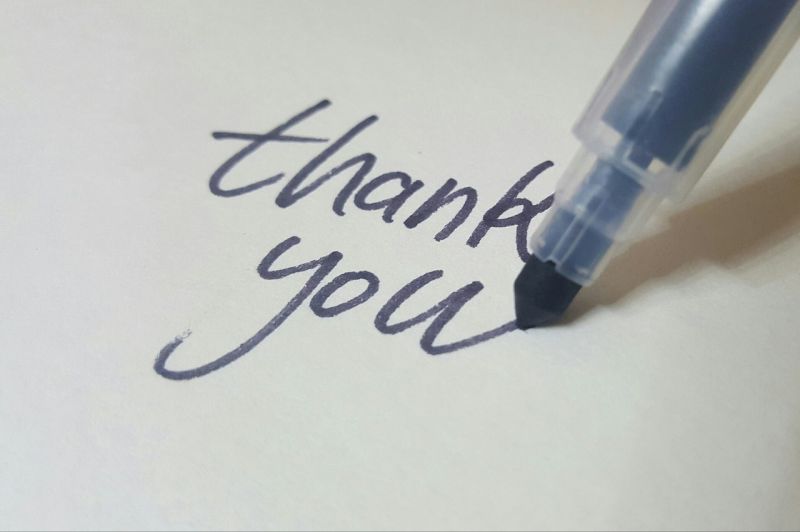
Spanish
- gracias (GRAH-syahs)
— is the word for thank you in many languages including Spanish
Spanish is the second most widely used language in the world natively spoken by more than 437 million people including Spain, most of Central and South America, Mexico, and the USA. There are over 21 countries in the world that have Spanish as their official language. It is a Romance language that originated in the Iberian Peninsula.
Sundanese
- hatur nuhun
Sundanese is a Malayo-Polynesian language spoken by about 39 million people mainly in western Java in Indonesia. There are also speakers in Banten, Jakarta, parts of western Central Java and southern Lampung. It is the third most-spoken language in Indonesia.
Swahili
- asante (ah-sahn-teh)
Swahili is a Bantu languages spoken by the Swahili communities in Kenya, Tanzania, Uganda, Rwanda, Burundi, Mozambique, and the Democratic Republic of Congo.
Swati
- ngiyabonga (Nni-ya-bonga)
Swati is a Bantu language of the Nguni group spoken in Eswatini and South Africa by the Swazi people. The number of speakers is estimated to be in the region of 12 million.
Swedish
How to say thank you in Swedish:
- tack (tahkk)
Swedish is a North Germanic language, closely related to Norwegian and Danish spoken by over 9 million people. It is the national language of Sweden and the official language of the Åland Islands.
Swiss German
- dankeschön
Swiss German is the collective name for the great variety of Upper German dialects spoken in Switzerland, Liechtenstein, in the Austrian province of Vorarlberg, in parts of Baden-Württemberg in Germany and Alsace in France.
Tagalog Filipino
- salamat po (sa-LAH-maht poh) – formal
- Salamat (sa-LAH-maht) – informal
Tagalog is an Austronesian language spoken as a first language by a quarter of the population of the Philippines and as a second language by the majority. Its standardized form, officially named Filipino, is the national language of the Philippines, and is one of two official languages alongside English.
Tahitian
- māuruuru (mah-roo-roo)
Tahitian belongs to the Eastern Polynesian language group, spoken mainly on the Society Islands in French Polynesia and Bora Bora.
Taiwanese Hokkien
- xie xie ni (shh-yeah shh-yeah nee)
Taiwanese Hokkien is the Hokkien dialect of Min Nan as spoken by about 70 percent of the population of Taiwan.
Tajik
Thank you in Tajik:
- sipos сипос
Tajik is the main language of Tajikistan, closely related to Farsi and Kurdish. Since the late 1930s, it is written using a variant of the Cyrillic script.
Tamil
- nandri
Tamil is a Dravidian language spoken in southern India, Sri Lanka and Singapore by about 67.5 million people.
Tarifit
- choukrane (shok-run)
Tarifit is spoken by 8 million speakers in Arrif (Northern Africa) and Europe.
Tatar
- räxmät (rah-mat) Рәхмәт
Tatar (татарча), the national language of the Tatars, is a Turkic language spoken mainly in the Russian republic of Tatarstan as well as Siberia by about 7 million people.
Telugu
- dhanyavaadaalu (Dhan-ya-bad-dalu) ధన్యవాదాలు
Telugu is a Dravidian language spoken in the Indian states of Andhra Pradesh, Telangana and the union territories of Puducherry by 75 million Telugu people.
Thai
Thank you in Thai:
- khop khun khaa (cap-coohn KHAA) as a female
- khob khun krap (cap-coohn KRAP) as a male
Thai ภาษาไทย, the sole official and national language of Thailand, spoken by 50 million people, belongs to the Tai group of the Kra–Dai language family of Southeast Asia.
Tibetan
- thu-je-che ཐུགས་རྗེ་ཆེ་།
Tibetan is an official language of the Tibet Autonomous Region of the People’s Republic of China. The Tibetic languages are a cluster of Tibeto-Burman languages descended from Old Tibetan, spoken across a wide area of eastern Central Asia bordering the Indian subcontinent, including the Tibetan Plateau and the Himalayas.
Tsalagi Cherokee
- wado
Cherokee (Tsalagi) belongs to the Iroquoian language family. The Cherokee language is unique among Native American languages in that it is both a written and spoken language.
Tsonga
- ndza khensa
Tsonga is a Bantu language spoken by the Tsonga people totalling 12 million people mainly in South Africa, but also Mozambique and Eswatini.
Tswana
- ke a leboga
Tswana is a Bantu language spoken by about 4.4 million people in Bostwana, where it is the national and majority language, Namibia, Zimbabwe, and South Africa. The majority of speakers, about 3.6 million, live in South Africa, where the language is officially recognised.
Turkish
Thank you in Turkish:
- tesekkür ederim (teh-sheh-kur eh-deh-rim)
Turkish is a Turkic language believed to be of the Altaic language family spoken mainly in Turkey, Northern Cyprus, Cyprus and other countries of the former Ottoman Empire by about 88 million people.
Turkmen
- sag boluň
Turkmen belongs to the Turkic language family and is spoken by around 11 million Turkmen people of Central Asia, mainly in Turkmenistan, Afghanistan, and Iran.
Tuvaluan
- fakafetai
— pronounced (fah-keh-feh-tay)
Tuvaluan is a Polynesian language that is native to Tuvalu, Fiji, Kiribati, and Nauru.
Ukrainian
Thank you in Ukrainian is:
- dyakuyu (DYAH-koo-yoo) Дякую
Ukrainian is an Eastern Slavic language spoken mainly in Ukraine by about 51 million people.
Urdu
- ab ka Shukriya آپ کا شکریہ
Urdu is the official national language and lingua franca of Pakistan. It is a member of the Indo-Aryan group within the Indo-European family of languages and is mutually intelligible with Hindi.
Uzbek
- rahmat (RAH-mat)
Uzbek is a Turkic language that is the official national language of Uzbekistan spoken by around 27 million people.
Vietnamese
How to say thank you in Vietnamese:
- cảm ơn bạn (come-un-baan) — formal
- cảm ơn (come-un) — casual
Vietnamese is an Austroasiatic language spoken mainly in Vietnam, where it is the national and official language, by about 82 million people.
Welsh
How to say thank you in Welsh:
- diolch (DEE-ol’ch)
Welsh is a Brittonic language of the Celtic language family spoken natively in Wales, and by some in England.
Wolof
- Jai-rruh-jef
Wolof is a national language of Senegal, where it is spoken by approximately 5.4 million people as a first language. It belongs to the Atlantic group of the Niger-Congo language family and is the native language of the Wolof people.
Xhosa
- enkosi
Xhosa is a Nguni Bantu language with click consonants and is one of the official languages of South Africa. It is spoken as a first language by approximately 8.2 million people and by another 11 million as a second language in South Africa, mostly in Eastern Cape Province.
Yiddish
- a dank אַ דאַנק
Yiddish is the historical language of the Ashkenazi Jews originating during the 9th century in Central Europe. Belonging to the Indo-European language family, it is spoken by 1.5 million people.
Yoruba
- e dupe
Yoruba is a pluricentric language spoken in West Africa with the number of speakers estimated between 30 and 40 million. It is a language spoken principally in Nigeria and Benin, with communities in Sierra Leone, Liberia, other places of Africa.
Zulu
Say thank you in Zulu:
- ngiyabonga (Nn-i-ya bong-ga)
Zulu is a member of the Bantu/Nguni family of languages. It is one of the official languages of South Africa spoken by about 10 million people mainly in Zululand and northern Natal in South Africa and also in Botswana, Lesotho, Malawi, Mozambique, and Eswatini.
Thank You in Other Languages — BONUS
Here are a couple final different languages for thank you….

American Sign Language (ASL)
How to say thank you in American Sign Language:
- start with the fingers on your dominant hand and place them near your lips. Keep your hand flat and move your hand forward and down in the direction of the person you want to thank. Smile so they know you mean it.
American Sign Language is a complete, natural language that has the same linguistic properties as spoken languages, with grammar that differs from English, expressed by movements of the hands and face.
British Sign Language (BSL)
How to say thank you in British Sign Language:
- start with the fingers on your dominant hand and place them near your lips. Keep your hand flat and move your hand forward and down in the direction of the person you want to thank. Smile so they know you mean it.
British Sign Language is a sign language used in the United Kingdom as the first or preferred language of some deaf people. The language makes use of space and involves movement of the hands, body, face, and head.
Espetanto
- Dankon
Esperanto is an artificially constructed language and belongs to no linguistic family, with most of its vocabulary coming from the Romance languages. This phonetic language is the most widely spoken constructed international auxiliary language.
Klingon
Say thank you in Klingon:
- Qapla
Klingon is a language that was made for the Klingons in the Star Trek movie. It is a constructed language, and not one that developed naturally. Only a few people can speak the Klingon language well enough to talk in it.
Minionese
- Bank yu
Minionese spoken by the minions of the Despicable Me movie series appears to be a polyglot language which borrows words and grammatical rules from many different languages.
Na’vi
- Iráyo
Na’vi is a constructed language, created for the fictional Na’vi, the humanoid inhabitants of the moon Pandora in the 2009 film Avatar.
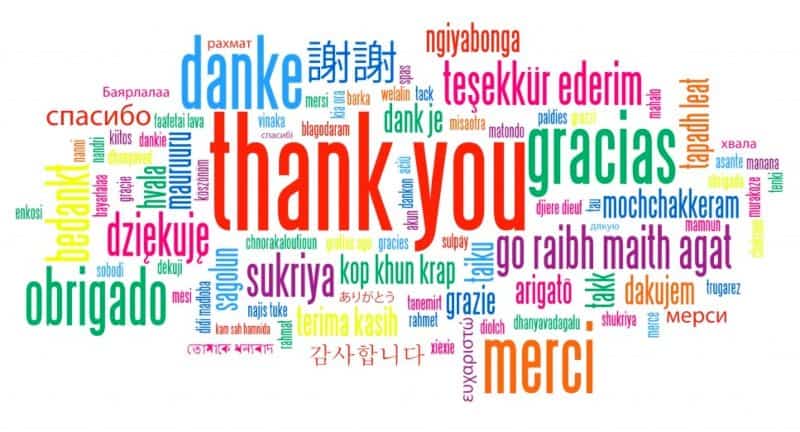
LEARN THESE OTHER WORDS TOO!
This guide will help you say family in different languages.
Definitely this guide on how to say cheers in other languages.
How to say happy birthday in every language.
Alternatively this guide on how to say light in many languages.
Read this guide to say hello in every language of the world.
How about this guide to say goodbye in every language of the world.
Learn how to say my love in different languages.
Or read this guide to say good morning in all languages.
How about this guide on how to say beautiful in other languages.
Check this guide on how to say friendship in other languages.
Maybe this guide on how to say good night in other languages.
Or read this guide on the word for love in different languages of the world.
Aaaaaaaand now you know how to say thank you in different languages of the world!
OVER TO YOU GUYS! How do you say THANK YOU in your language? Extra points if you can speak several languages… Let me know in the comments.
Merci beauoup,
Rai
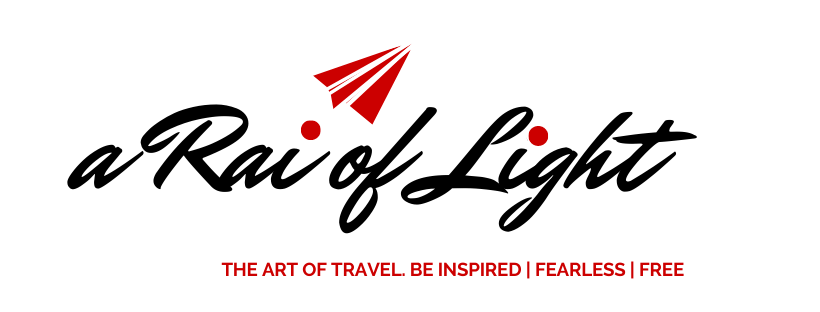


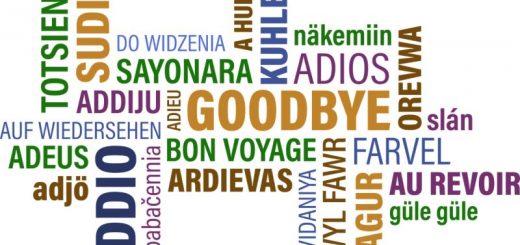
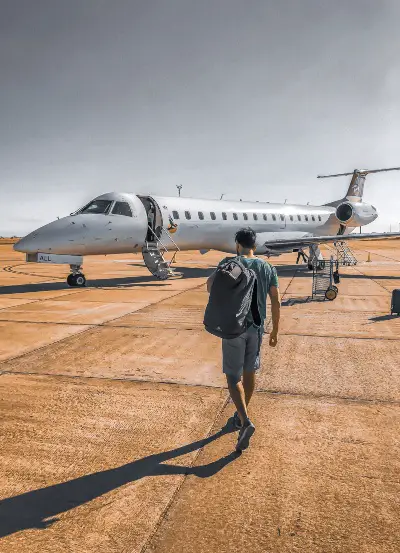 New Here?
New Here? 







